The Globalization Journey of Chinese Enterprises: The Legal Challenges and Compliance Risk Control Forum Successfully Concluded | Dacheng · Event Report
Release date:2024-12-01
In the context of deepening global economic integration and the coexistence of international cooperation and competition, Chinese enterprises are standing at a new historical starting point, facing unprecedented opportunities as well as severe challenges brought by a complex and changing international environment. To explore this era's topic in depth and provide strong support for Chinese enterprises to navigate the waves in the process of globalization, on the afternoon of November 29,taking the opportunity of the "Open Cooperation, Overseas Innovation for the Future - Co-building the 'Belt and Road' and Overseas Legal Services Exchange and Connection Conference", the Beijing Dacheng (Shanghai) Law Firm held the"Age of Exploration: Opportunities and Challenges for Chinese Enterprises Going Global"forum successfully concluded. This forum was divided into two parallel sessions, with the second session focusing on"The Globalization Journey of Chinese Enterprises: Legal Challenges and Compliance Risk Control Forum"theme, where several industry experts and representatives conducted in-depth analysis and discussion on key issues, aiming to provide precise and practical strategic advice for Chinese enterprises to steadily move towards the global market.
Wu Chenyiao, Director of the Board of Dacheng China Region and Member of the Dacheng Shanghai Management Committee,delivered a speech. First, he warmly welcomed the guests present. He mentioned that in the wave of globalization, Chinese enterprises are heading towards the world at an unprecedented speed and scale. However, the path of globalization is also filled with unknowns and challenges. For Chinese enterprises to go further and more steadily on the path of globalization, they must have a global perspective, uphold an open and inclusive mindset, and adopt a more proactive attitude to meet challenges and seize opportunities. He also pointed out that globalization is not only an economic phenomenon but also a profound cultural exchange. In the process of going global, Chinese enterprises must not only comply with the rules of the international market but also respect local cultural traditions to ensure that they can walk more steadily and further on the path of globalization. Lawyer Wu also emphasized that legal challenges and compliance risk control are important issues that Chinese enterprises must face in the process of globalization. Solid legal knowledge and keen insight and judgment are fundamental conditions for safeguarding the development of enterprises. He further noted that when Chinese enterprises replicate their past manufacturing models in countries along the 'Belt and Road', rely on state-owned enterprises' overseas platforms to expand international markets, or integrate global resources for industrial investment and supply chain layout, they must deepen their understanding of international rules, international practices, and local laws and regulations, and keep up with the latest trends in global economic trade security to promote compliant operations. In the face of international disputes, enterprises should be adept at utilizing the international legal system and institutions, relying on a professional team of international legal experts to obtain the most efficient and stable legal support, thereby effectively safeguarding their overseas rights and interests. On this basis, enterprises should also actively transform overseas winning judgments and international arbitration awards into widely influential and binding practices, precedents, and examples to enhance their international legal status and voice. Finally, Lawyer Wu stated that as long as confidence is firm, responses are proactive, and innovation is continuous, Chinese enterprises will surely overcome various difficulties on the path of globalization and achieve leapfrog development. Let us work hand in hand to jointly create a new chapter in the globalization of Chinese enterprises.Wu Chenyiao, Director of the Board of Dacheng China Region and Member of the Dacheng Shanghai Management Committee
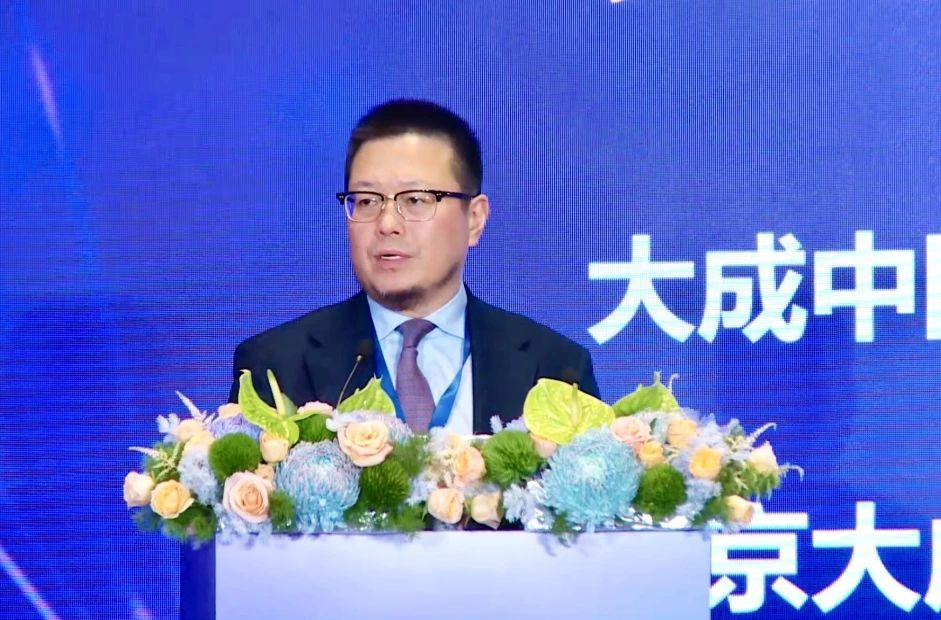
Chen Feng, Vice Chairman of the Advisory Committee of Dacheng China Region, Director of the Board, and Vice President of the Shanghai Law Society's 'Belt and Road' Legal Research Association,
brought a thematic sharing titled"Practical Exploration of Dispute Resolution in 'Belt and Road' Investment and Trade".First, regarding the development of the 'Belt and Road', Lawyer Chen Feng stated that with the increasing frequency of international commercial activities, the number and complexity of commercial disputes have also increased, and how to effectively resolve these disputes has become one of the key issues to ensure the smooth advancement of the 'Belt and Road'. Next, Lawyer Chen mentioned that to address the growing number of commercial disputes and controversies in commercial exchanges and trade cooperation among countries along the 'Belt and Road', our country has gradually established a diversified international commercial dispute resolution mechanism, including international commercial litigation, international commercial arbitration, as well as international commercial consultation, settlement, or mediation. Subsequently, Lawyer Chen Feng shared examples from four cases he handled in 'Belt and Road' cases. He used the example of "A global leading non-ferrous metal mining company vs. the Government of the Democratic Republic of the Congo investment dispute ICSID international arbitration case" to share the importance of strategic lawyers in resolving major international commercial disputes. He then applied typical cases such as "Shanghai Arbitration Commission arbitration award applied for recognition and enforcement in the Singapore High Court", "Canadian commercial arbitration institution arbitration award applied for recognition and enforcement in domestic people's courts", and "domestic new energy vehicle companies' carbon emission credit disputes in the EU resolved through consultation, successfully avoiding huge fines for Chinese car companies". He emphasized that cross-border investment is a complex and challenging activity, but as long as investors can actively utilize international legal resources, closely monitor policy changes, accurately understand transaction documents, choose appropriate dispute resolution avenues, pay attention to changes in the laws and regulations of the host country, and seek help from professional legal teams, they can better cope with various challenges and risks, achieving long-term success in investment activities. Finally, Lawyer Chen emphasized the importance of clearly defining dispute resolution clauses in contracts during the drafting stage of transaction documents. He highlighted the necessity of conducting comprehensive risk assessments before making investments or trades and properly recording and preserving all relevant documents and communications during the transaction process. If disputes arise, appropriate dispute resolution strategies should be chosen based on the specific circumstances of the case. He also specifically mentioned that cross-border investment and trade disputes often involve multiple countries and even multiple fields, and forming a team that communicates smoothly, responds quickly, and possesses professional competence is crucial for effectively addressing disputes.Chen Feng, Vice Chairman of the Advisory Committee of Dacheng China Region, Director of the Board, and Vice President of the Shanghai Law Society's 'Belt and Road' Legal Research AssociationThe roundtable discussion's theme was
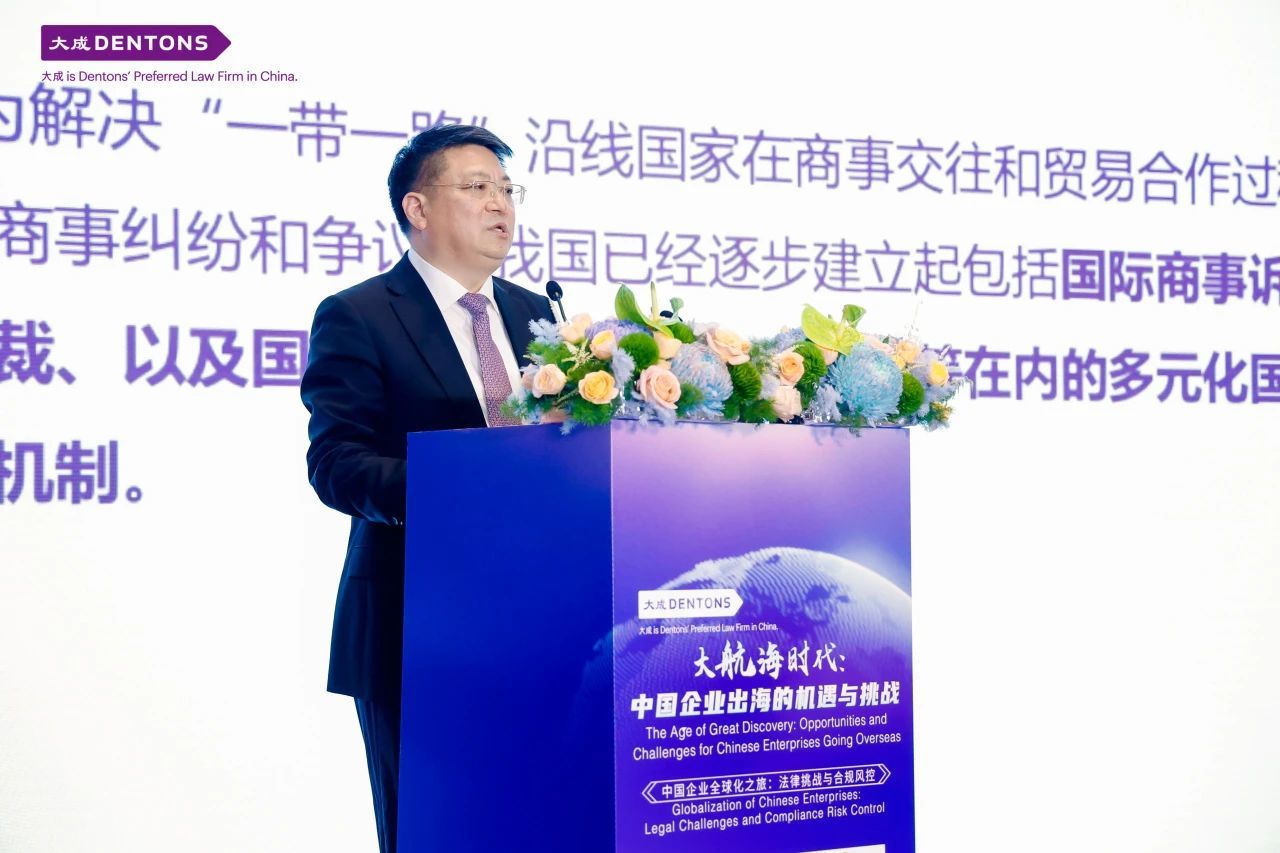
"Dispute Resolution Practices for Chinese Enterprises Operating Overseas"
, hosted by Dacheng Shanghai partner
Cheng Jiamiao.The discussion guests included: Dentons Hong Kong Office PartnerHu Wenjun,Dentons Singapore Office Chief Operating Officer and Senior PartnerLiu Jiaming,Dacheng Shanghai PartnerZou Zhiqiang,Director of Legal Risk Control at Qingxin CapitalZhou Xuanhe,and Director of the Legal Affairs Department at China Power Investment Corporation Green Energy Technology Co., Ltd.Liu Shijia.周宣合、中电投绿能科技有限公司法律事务部总监刘诗嘉Guests mentioned that Chinese enterprises face multiple challenges in entering overseas markets, including cultural differences, integrity tests, and economic pressures. As trade relations between Singapore and China deepen, related disputes have also increased. Singapore has now become the international arbitration center second only to London, and of course, Hong Kong, as a traditional international arbitration center, also has its advantages and is a place that Chinese enterprises can choose. Guests also emphasized the importance of language communication in international commercial activities through specific cases.
In addition, guests mentioned that international arbitration has become the preferred method for resolving cross-border disputes, but the cross-border enforcement of administrative judgments remains a significant challenge for Chinese parties and lawyers. During the cross-border recovery and enforcement process, the judgments and enforcement of foreign courts have a certain degree of possibility. They also delved into issues of cross-border freezing and asset preservation in international arbitration and cross-border litigation. When discussing the ultimate goal of dispute resolution, guests stated that the ultimate goal is to eliminate disputes; therefore, experiences in reducing and avoiding disputes should be drawn from the disputes themselves. Guests emphasized that leaving a trace is crucial in all negotiation and communication processes. Although international disputes are usually resolved through arbitration, in the face of different types of business, solutions suitable for specific situations can also be chosen, such as investment arbitration, mediation mechanisms, and civil waivers and sovereign immunity in investment arbitration. When discussing the geographical location of dispute resolution clauses, guests expressed that Hong Kong and Singapore have significant advantages in this regard. Thus, they shared in-depth the conveniences and mutual recognition between the mainland and Hong Kong, while also sharing the special advantages of Singapore for the asset protection and safety of Chinese enterprises. However, the final choice still needs to be comprehensively considered based on factors such as trading partners, preservation measures in both places, distance, and cultural understanding. Finally, when discussing how Chinese enterprises should formulate dispute resolution clauses, guests suggested proceeding with caution and emphasized the importance of public law-type remedies when choosing the location for dispute resolution, in addition to considering ordinary litigation and arbitration.
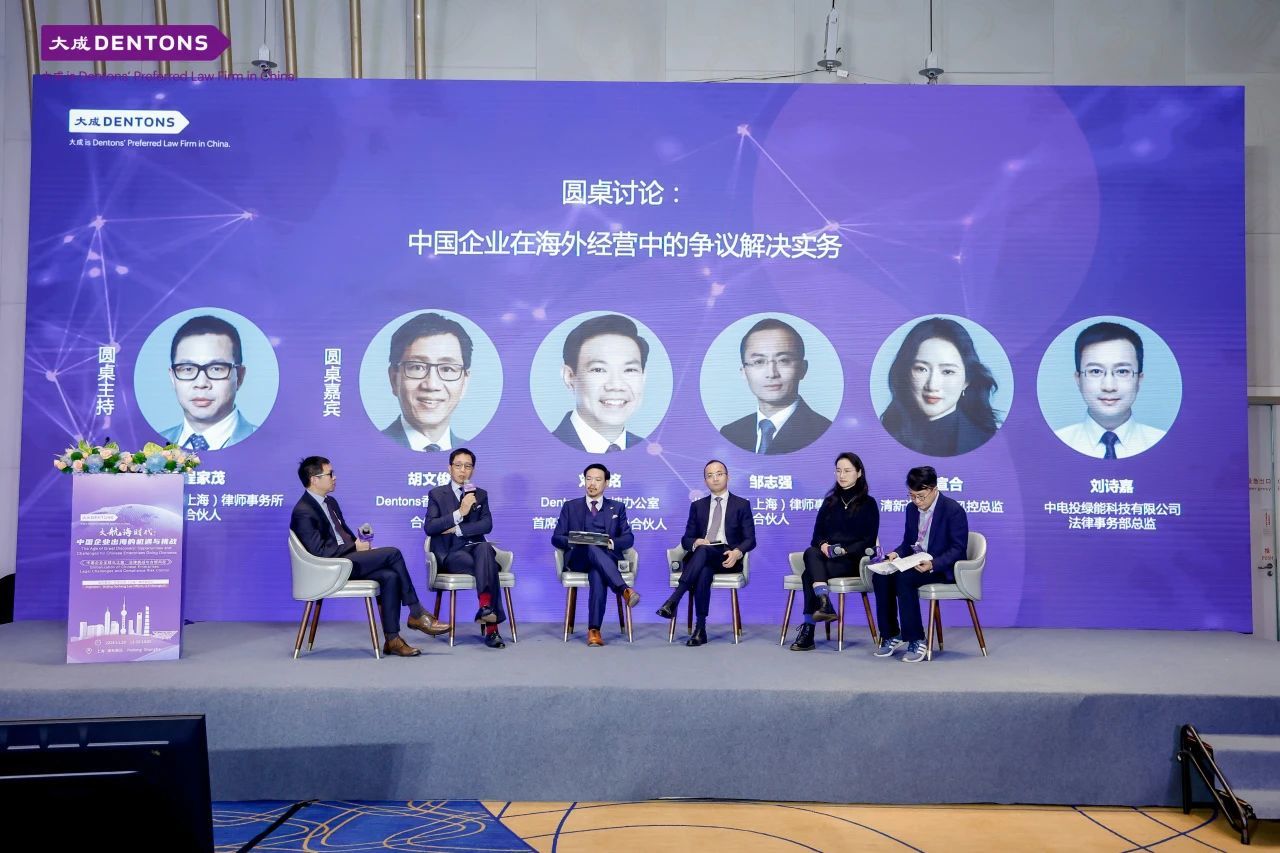
Roundtable Discussion (from left to right)
Dacheng Shanghai Partner Cheng Jiamiao
Dentons Hong Kong Office Partner Hu Wenjun
Dentons Singapore Office Chief Operating Officer and Senior Partner Liu Jiaming
Dacheng Shanghai Partner Zou Zhiqiang
Qingxin Capital Legal Risk Control Director Zhou Xuanhe
China National Electric Power Investment Corporation Green Energy Technology Co., Ltd. Legal Affairs Department Director Liu Shijia
Dacheng Shanghai PartnerSun QingnanLawyer on“New Challenges Faced by the New Energy Vehicle Industry Chain Going Global under Global Layout”Themed sharing. She depicted the current development status of the global new energy vehicle market through detailed data and cases, exploring China's position as a major producer and consumer of new energy vehicles and its acquisition trends in the European market. Next, Lawyer Sun elaborated on the latest trends of the automotive industry chain going global from five perspectives: increased greenfield investment, capacity going abroad, industry chain going abroad, Southeast Asian market, Middle East and African markets, South American market, and the trend of service-oriented development. These trends reflect the deep layout and diversified development of China's new energy vehicle industry in the global market. Lawyer Sun also pointed out a series of new challenges faced by the automotive industry chain going global, including subsidies and counter-subsidies, sanctions and counter-sanctions, infrastructure and supply chain stability issues, as well as data security and compliance challenges in cross-border transmission. Finally, she emphasized that the Chinese new energy vehicle industry chain is facing both historical opportunities for market growth and numerous challenges that need to be addressed during the process of going global. Building a professional international team and strengthening compliance management will be key to the sustainable development of Chinese new energy vehicle enterprises in the global market.
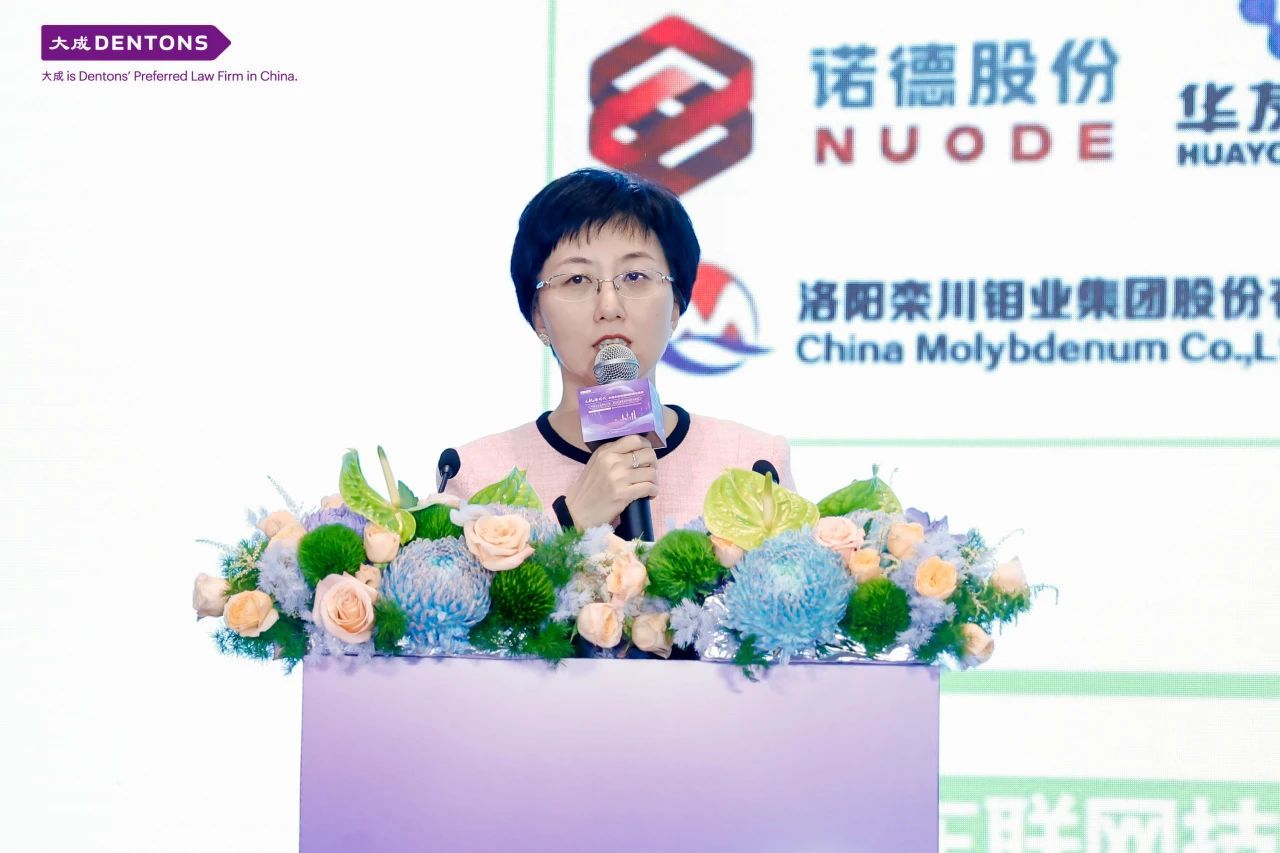
Dacheng Shanghai Partner Sun Qingnan
Dacheng Shanghai PartnerChen LitongLawyer on“Corporate Governance and Risk Prevention for Energy Enterprises Going Global”sharing. First, Lawyer Chen introduced the construction of a compliance management system as corporate governance and risk prevention, emphasizing its importance. He stated that corporate governance and risk prevention safeguard stable development and compliance operations for energy enterprises going global. Next, Lawyer Chen used practical cases to emphasize the importance of establishing a compliance management system, including formulating compliance policies, setting up compliance departments, and conducting compliance training, to ensure that corporate behavior complies with local laws and regulations and international standards, in order to address various challenges in overseas operations and ensure sustainable development. Finally, he and the attending guests discussed in depth how energy enterprises can strengthen compliance management and reduce legal risks when facing challenges such as international trade risks, anti-dumping investigations, and long-arm jurisdiction.
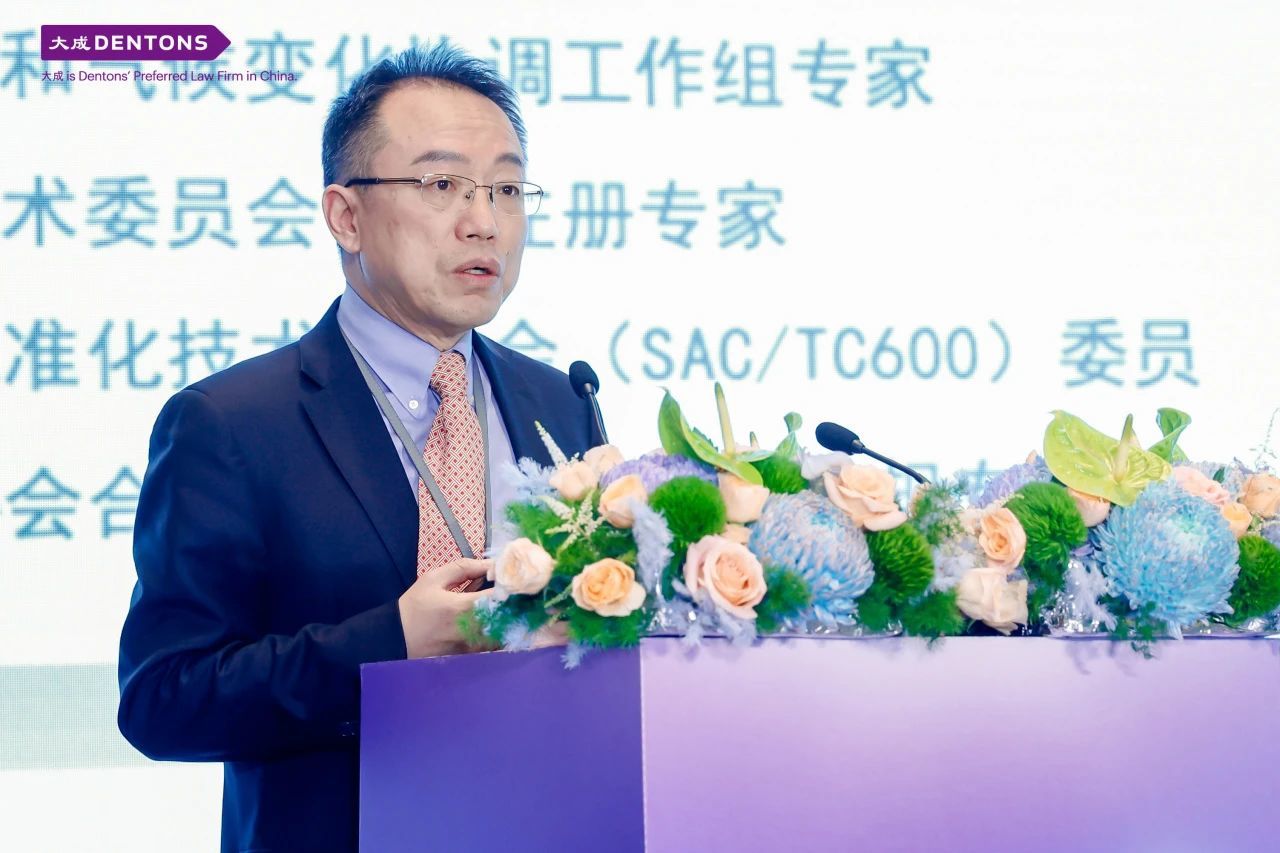
Dacheng Shanghai Partner Chen Litong
Dacheng Shanghai PartnerYu ChengzhiFirst, regarding the development of the 'Belt and Road', Lawyer Chen Feng stated that with the increasing frequency of international commercial activities, the number and complexity of commercial disputes have also increased, and how to effectively resolve these disputes has become one of the key issues to ensure the smooth advancement of the 'Belt and Road'. Next, Lawyer Chen mentioned that to address the growing number of commercial disputes and controversies in commercial exchanges and trade cooperation among countries along the 'Belt and Road', our country has gradually established a diversified international commercial dispute resolution mechanism, including international commercial litigation, international commercial arbitration, as well as international commercial consultation, settlement, or mediation. Subsequently, Lawyer Chen Feng shared examples from four cases he handled in 'Belt and Road' cases. He used the example of "A global leading non-ferrous metal mining company vs. the Government of the Democratic Republic of the Congo investment dispute ICSID international arbitration case" to share the importance of strategic lawyers in resolving major international commercial disputes. He then applied typical cases such as "Shanghai Arbitration Commission arbitration award applied for recognition and enforcement in the Singapore High Court", "Canadian commercial arbitration institution arbitration award applied for recognition and enforcement in domestic people's courts", and "domestic new energy vehicle companies' carbon emission credit disputes in the EU resolved through consultation, successfully avoiding huge fines for Chinese car companies". He emphasized that cross-border investment is a complex and challenging activity, but as long as investors can actively utilize international legal resources, closely monitor policy changes, accurately understand transaction documents, choose appropriate dispute resolution avenues, pay attention to changes in the laws and regulations of the host country, and seek help from professional legal teams, they can better cope with various challenges and risks, achieving long-term success in investment activities. Finally, Lawyer Chen emphasized the importance of clearly defining dispute resolution clauses in contracts during the drafting stage of transaction documents. He highlighted the necessity of conducting comprehensive risk assessments before making investments or trades and properly recording and preserving all relevant documents and communications during the transaction process. If disputes arise, appropriate dispute resolution strategies should be chosen based on the specific circumstances of the case. He also specifically mentioned that cross-border investment and trade disputes often involve multiple countries and even multiple fields, and forming a team that communicates smoothly, responds quickly, and possesses professional competence is crucial for effectively addressing disputes.“How New Energy Enterprises Respond to the Challenge of 'Decoupling from China' in Global Supply Chain Integration”keynote speech. First, Lawyer Yu introduced the challenges of 'decoupling from China' and the ways to respond. She stated that restrictions imposed by developed and developing countries on Chinese enterprises regarding market access, government subsidies, and project bidding have increased the challenges of 'decoupling from China' in global supply chain integration. To address this series of challenges, we have also made new adjustments in internal management, shareholding ratios, market promotion, and equity structure. Next, Lawyer Yu introduced the global year-round legal services launched to respond to this challenge, detailing the service content, representative cases, and the importance and necessity of global legal services, helping Chinese enterprises move steadily forward in the process of globalization. Finally, Lawyer Yu specifically mentioned the upcoming upgrade of the 'Going Global Index' mini-program, emphasizing that this innovative tool will deeply integrate AI technology to achieve intelligent introduction and efficient matching of service scenarios, reducing costs and increasing efficiency.
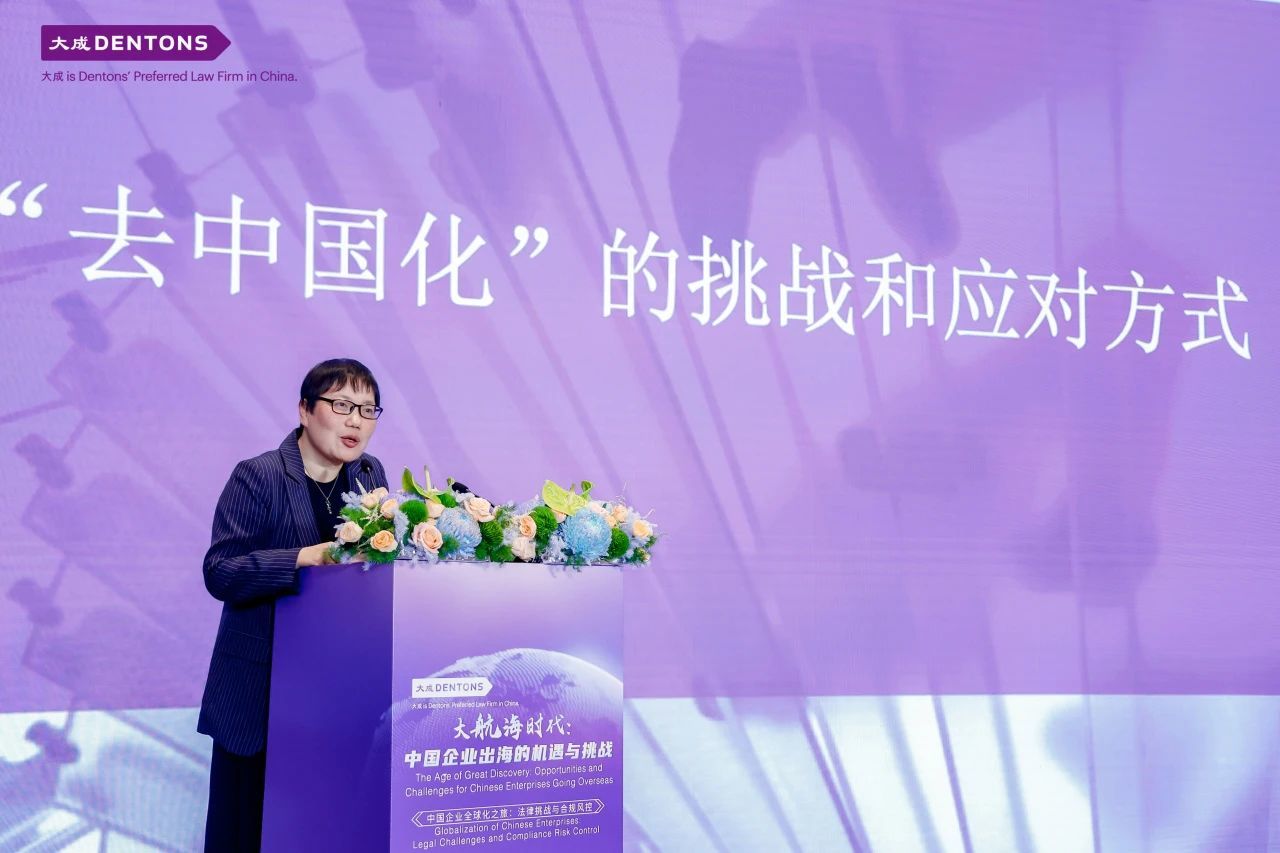
Dacheng Shanghai Partner Yu Chengzhi
Cheng Jiamiao.“Thoughts on the 'Investment, Construction, and Operation Integration' Model of International Engineering in the New Era”Hu Wenjun,Zhu YunyanLawyer hosting. The discussion guests included: Dentons Indonesia Office PartnerMaurice Maulana SitumorangZhou Xuanhe,Sun Ying, Dacheng Law Firm Partner (pending registration), former Secretary-General of the Shanghai Arbitration Commission Shanghai Construction Engineering Arbitration CourtWei LongyanZhou Xuanhe,delivered a speech. First, he warmly welcomed the guests present. He mentioned that in the wave of globalization, Chinese enterprises are heading towards the world at an unprecedented speed and scale. However, the path of globalization is also filled with unknowns and challenges. For Chinese enterprises to go further and more steadily on the path of globalization, they must have a global perspective, uphold an open and inclusive mindset, and adopt a more proactive attitude to meet challenges and seize opportunities. He also pointed out that globalization is not only an economic phenomenon but also a profound cultural exchange. In the process of going global, Chinese enterprises must not only comply with the rules of the international market but also respect local cultural traditions to ensure that they can walk more steadily and further on the path of globalization. Lawyer Wu also emphasized that legal challenges and compliance risk control are important issues that Chinese enterprises must face in the process of globalization. Solid legal knowledge and keen insight and judgment are fundamental conditions for safeguarding the development of enterprises. He further noted that when Chinese enterprises replicate their past manufacturing models in countries along the 'Belt and Road', rely on state-owned enterprises' overseas platforms to expand international markets, or integrate global resources for industrial investment and supply chain layout, they must deepen their understanding of international rules, international practices, and local laws and regulations, and keep up with the latest trends in global economic trade security to promote compliant operations. In the face of international disputes, enterprises should be adept at utilizing the international legal system and institutions, relying on a professional team of international legal experts to obtain the most efficient and stable legal support, thereby effectively safeguarding their overseas rights and interests. On this basis, enterprises should also actively transform overseas winning judgments and international arbitration awards into widely influential and binding practices, precedents, and examples to enhance their international legal status and voice. Finally, Lawyer Wu stated that as long as confidence is firm, responses are proactive, and innovation is continuous, Chinese enterprises will surely overcome various difficulties on the path of globalization and achieve leapfrog development. Let us work hand in hand to jointly create a new chapter in the globalization of Chinese enterprises.. The guests engaged in in-depth exchanges and sharing on topics such as the strategic risks faced by enterprises going global, the latest trends in the construction industry, and the legislative status of international policies. The guests pointed out that as the internationalization process of Chinese enterprises accelerates, international engineering business has gone through two stages from labor subcontracting to engineering business development and is now entering a brand new development stage. In this stage, Chinese enterprises have achieved qualitative leaps in technical capabilities, financial capabilities, and management capabilities. Today, Chinese engineering bidders no longer participate in bidding merely as the second party but are increasingly driving construction and operation through investment, achieving the development model of 'investment, construction, and operation integration.'
Partner at Dentons Indonesia Office, ASEAN Regional Contact for Dentons Global Mining and Natural Resources.Maurice Maulana SitumorangHe shared insights on the investment risks faced by Chinese enterprises in ASEAN countries, represented by Indonesia. He analyzed the risks of localization differences based on a case involving a Chinese client in Indonesia. He particularly mentioned that Indonesia has unique policies regarding foreign direct investment and construction, which also differ from other ASEAN countries (such as Thailand). Chinese enterprises need to fully understand these policy differences to better seize investment opportunities and address potential risks.
Next, the guests emphasized the importance of the legal system in international engineering. They believe that changing the previous model of Chinese engineering enterprises to protect investment risk areas with a comprehensive legal system is an important strategy for Chinese enterprises going abroad. They also pointed out that outbound international engineering has passed the rapid growth phase and is now entering a critical period of high-quality development. Therefore, Chinese enterprises need to adopt localized thinking, abandon the traditional model of doing first and settling later, and focus on multi-regional, multi-jurisdictional, and multi-national collaborative efforts. The guests also mentioned that most of the current cases encountered in contract management are related to guarantees, which requires Chinese enterprises to enhance their contract management capabilities.
In addition, they pointed out the trend characteristics of the F+EPC model in international engineering, and Lawyer Wei shared valuable big data on international construction dispute resolution. In terms of dispute resolution, the guests emphasized the importance of investment arbitration, interim arbitration, dispute review, and multi-level dispute resolution paths in current international engineering. Regarding the dispute resolution status of central state-owned enterprises in international engineering, the guests analyzed the main causes of disputes, including geological issues, environmental issues, and schedule issues. At the same time, they affirmed China's leading position in technology research and development in the international engineering sector, as well as the close relationship between the overall level of Chinese international engineering contractors and engineering R&D. In the context of the Belt and Road Initiative, the guests believe that Chinese international engineering not only carries the manufacturing and infrastructure investment capabilities of the new China but also provides Chinese enterprises with seamless transition opportunities and a land of both opportunities and risks. Finally, they emphasized that dispute resolution going abroad should be synchronized with physical expansion to ensure the steady development of Chinese enterprises in the international engineering field.
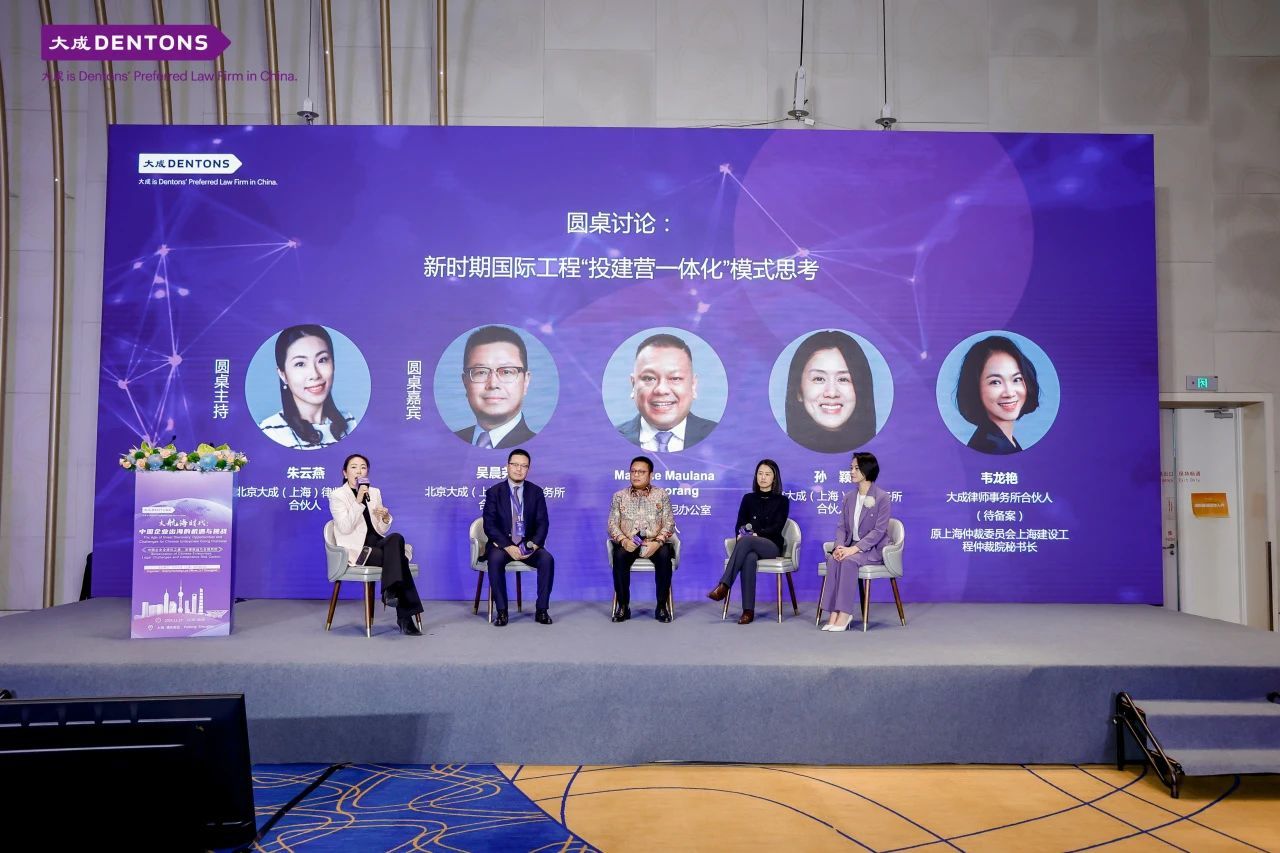
Roundtable Discussion (from left to right)
Zhu Yunyan, Partner at Dacheng Shanghai.
Wu Chenyiao, Partner at Dacheng Shanghai.
Maurice Maulana Situmorang, Partner at Dentons Indonesia Office.
Sun Ying, Partner at Dacheng Shanghai.
Partner at Dacheng Law Firm (pending registration).
Wei Longyan, former Secretary-General of the Shanghai Construction Engineering Arbitration Court of the Shanghai Arbitration Commission.
This forum was hosted by Huang Xiaoxu, a lawyer from Dacheng Shanghai.
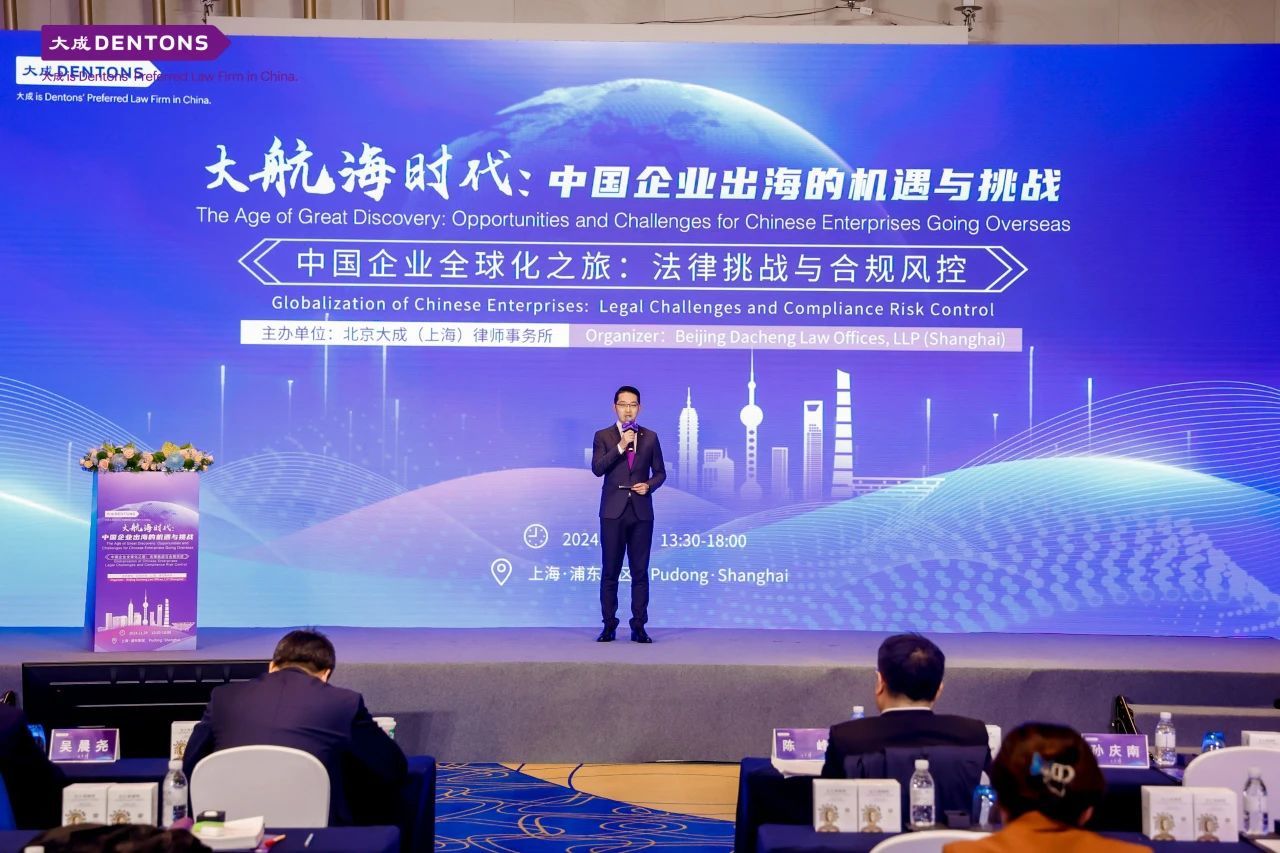
Huang Xiaoxu, Lawyer at Dacheng Shanghai.
Thus, the special forum "The Globalization Journey of Chinese Enterprises: Legal Challenges and Compliance Risk Control Forum" successfully concluded. This forum provided valuable experiences and profound insights for the guests regarding the legal challenges and compliance risk prevention issues faced by Chinese enterprises in the globalization process. In the future, Dacheng Shanghai will continue to uphold its professional, rigorous, and innovative philosophy, committed to providing solid legal support and guarantees for the overseas development of Chinese enterprises, helping them to move forward steadily and sail far.
Related Lawyers





